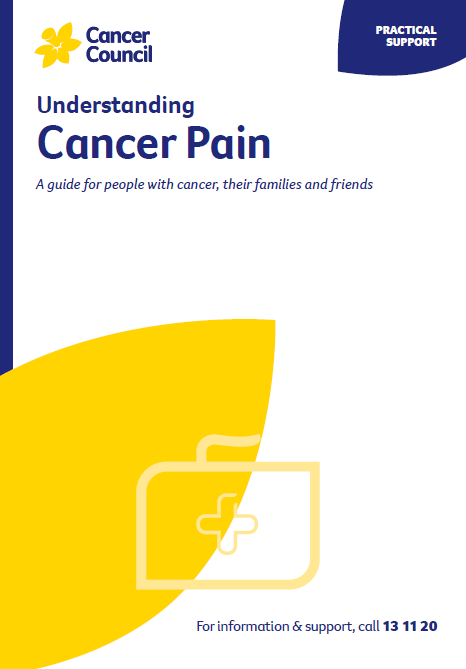- Home
- About Cancer
- Managing side effects
- Pain and cancer
- What is cancer pain?
- How is cancer pain managed?
How is cancer pain managed?
The way cancer pain is managed depends on the cause of the pain, but relief is still possible even if the cause is unknown. Often a combination of methods is used.
Options may include:
- medicines specifically for pain
- surgery, radiation therapy and cancer drug therapies
- procedures to block pain signals such as nerve blocks or spinal injections
- other therapies, such as physiotherapy, psychological support and complementary therapies
- pain management plans.
It might take time to find the right pain relief for you, and you may need to continue taking pain medicines while waiting for some treatments to take effect.
Different pain relief methods might work at different times, so you may need to try a variety. The World Health Organization estimates that the right medicine, in the right dose, given at the right time, can relieve 80–90% of cancer pain.
If you have a new pain, a sudden increase in pain or pain that doesn’t improve after taking medicines, let your doctor or nurse know. Like a cancer diagnosis, pain that is not well controlled can make you feel anxious or depressed.
→ READ MORE: When can I use pain medicines?
Podcast: Managing Cancer Pain
Listen to more episodes from our podcast for people affected by cancer
Meditation and Relaxation Podcast
Listen to more of our meditation and relaxation podcast for people affected by cancer
More resources
Professor Paul Glare, Chair of Pain Medicine, Northern Clinical School, Faculty of Medicine and Health, The University of Sydney, NSW (clinical update); Dr Tim Hucker, Pain Specialist, Northern Beaches Hospital, Director, Northern Beaches Pain Management, NSW (clinical update); Dr Keiron Bradley, Palliative Care Consultant, Bethesda Health Care, WA; A/Prof Anne Burke, Co-Director Psychology, Central Adelaide Local Health Network, President, Australian Pain Society, Statewide Chronic Pain Clinical Network, SA, School of Psychology, The University of Adelaide, SA; Tumelo Dube, Accredited Pain Physiotherapist, Michael J Cousins Pain Management and Research Centre, Royal North Shore Hospital, NSW; Prof Paul Glare (see above); Andrew Greig, Consumer; Annette Lindley, Consumer; Prof Melanie Lovell, Palliative Care Specialist HammondCare, Sydney Medical School and The University of Technology Sydney, NSW; Caitriona Nienaber, 13 11 20 Consultant, Cancer Council WA; Melanie Proper, Pain Management Specialist Nurse Practitioner, Royal Brisbane and Women’s Hospital, QLD; Dr Alison White, Palliative Medicine Specialist and Director of Hospice and Palliative Care Services, St John of God Health Care, WA.
View the Cancer Council NSW editorial policy.
View all publications or call 13 11 20 for free printed copies.

